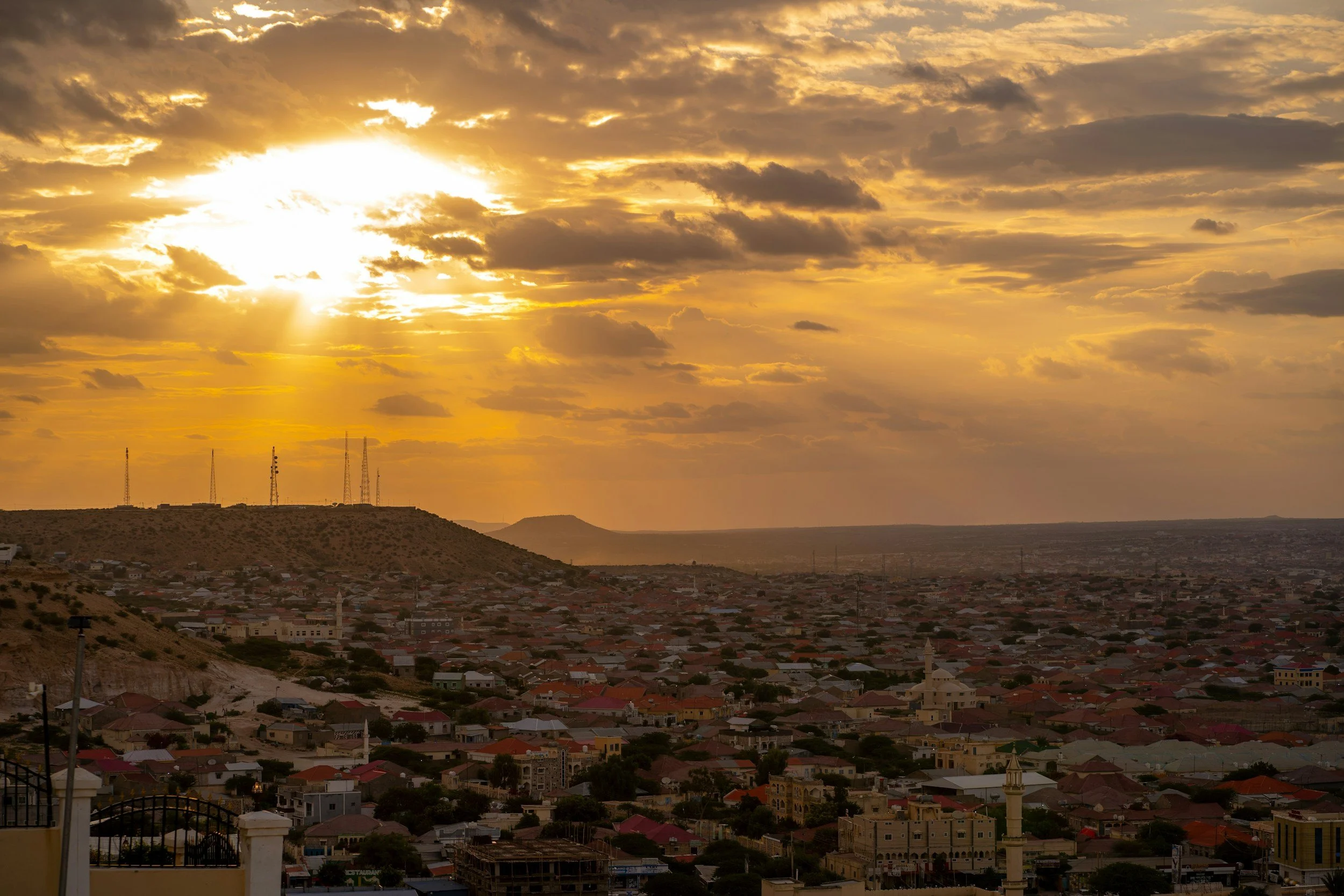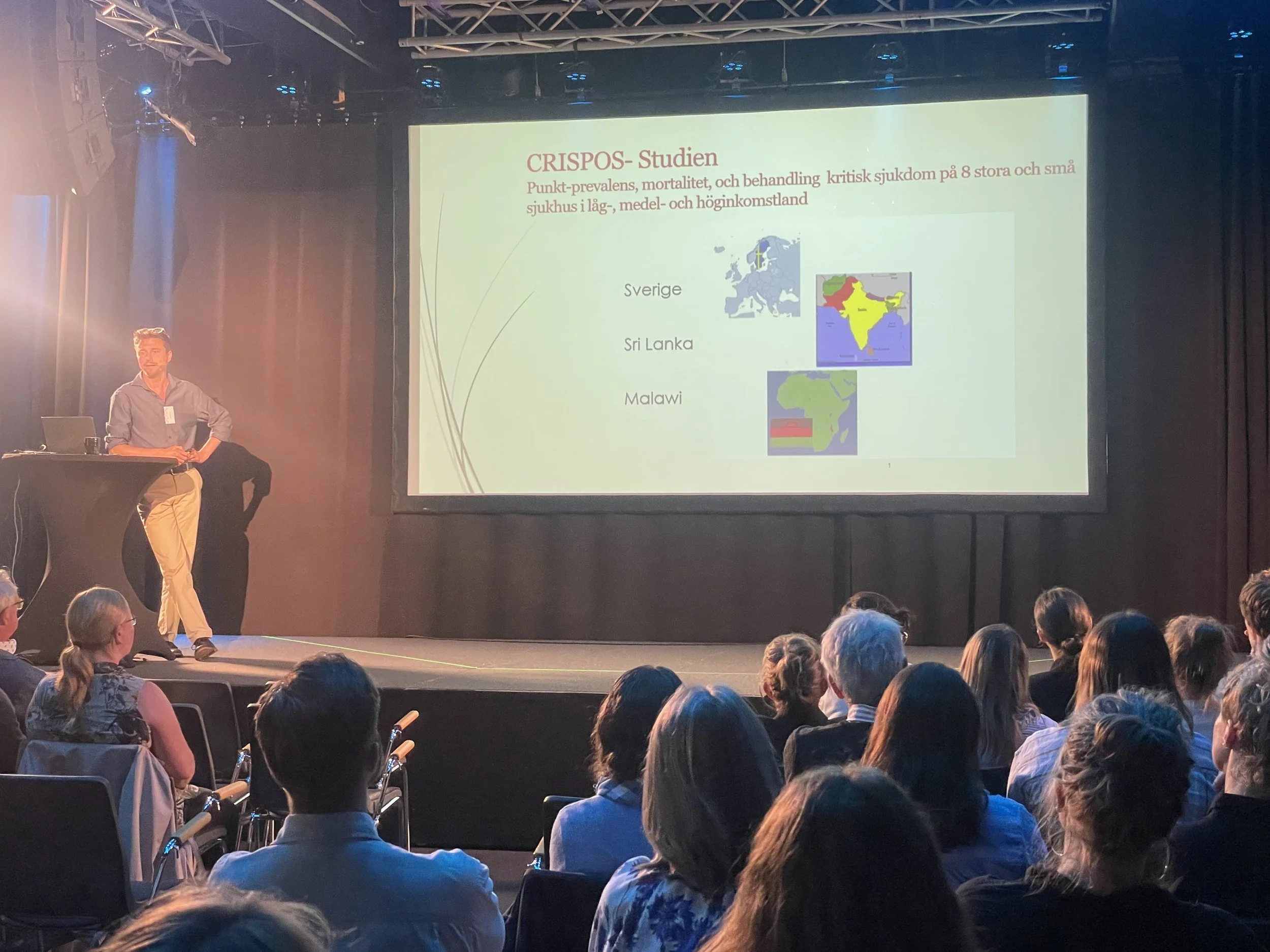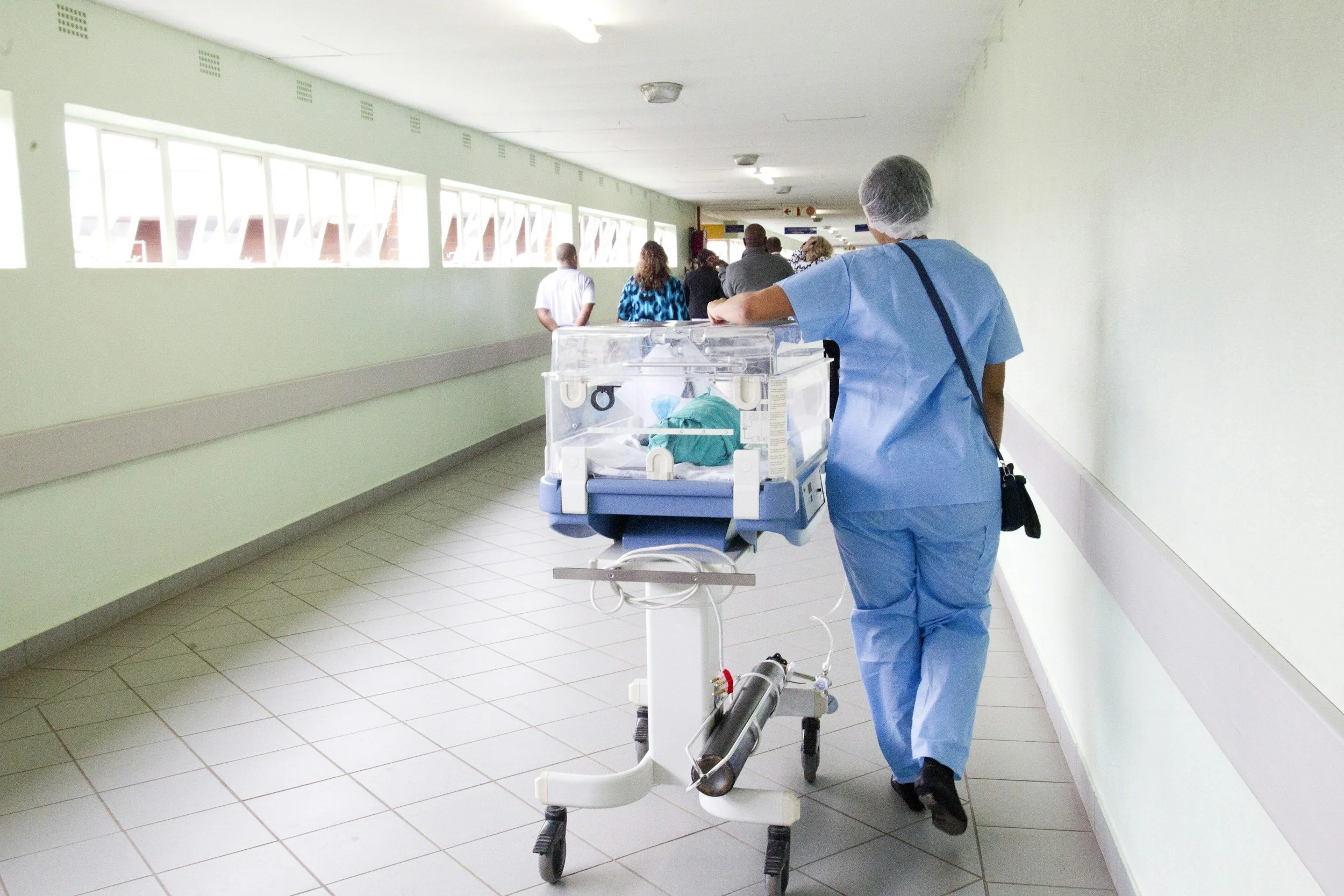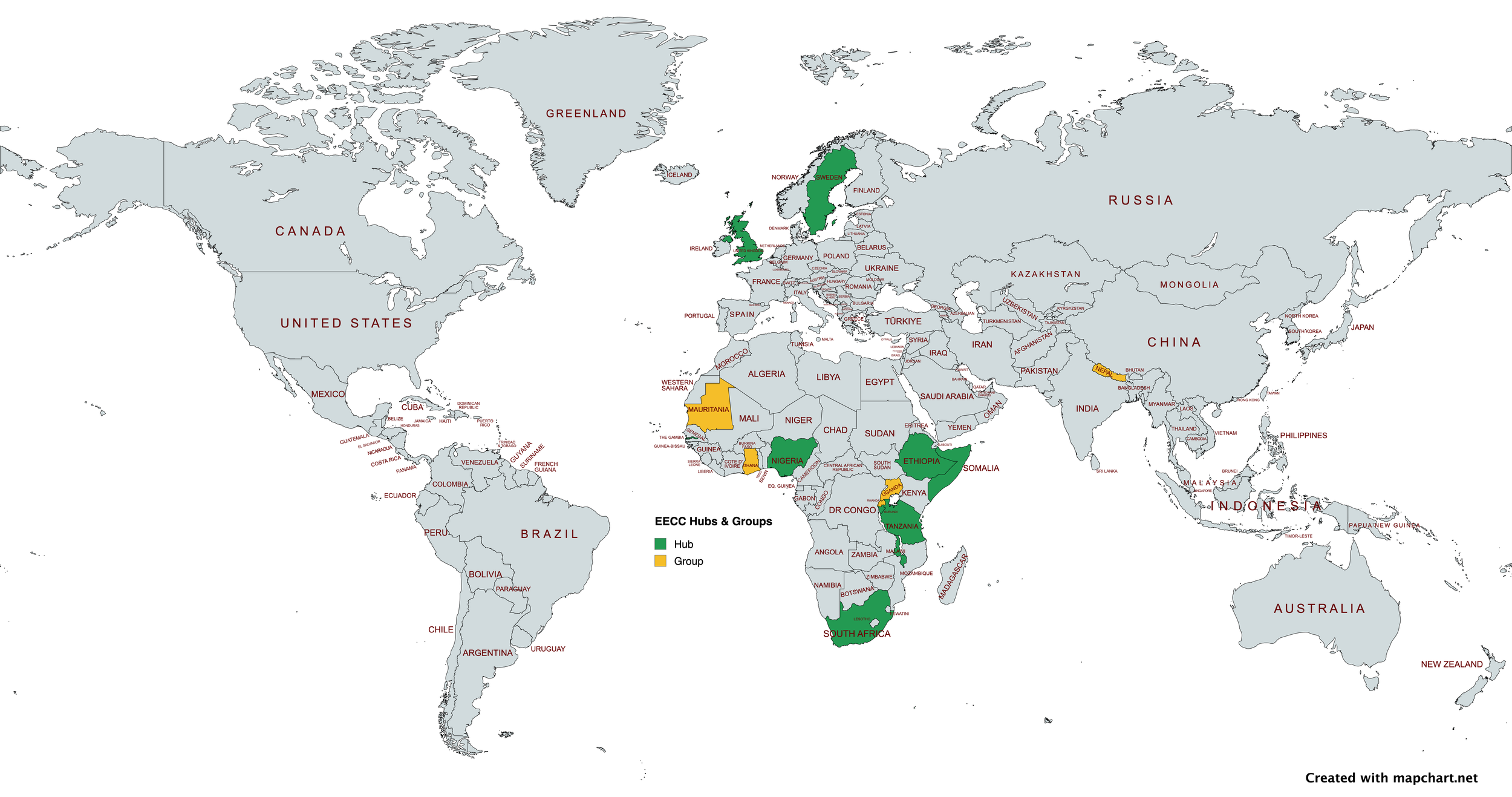
EECC National Hubs & Groups
EECC National Hubs & Groups are local teams improving care for critically ill patients by applying the vision and values of EECC in their own countries.
Mauritania’s new EECC Group, led by Dr Bouya Lekhlifa, has formed a diverse team of doctors, nurses, surgeons, and technical supporters committed to bringing EECC into hospitals and refugee settings.
The group has met with the Minister of Health to request official recognition and space to begin EECC training and assessments, while independently preparing their first training activities and expanding local membership as they build the Mauritania EECC Hub.
Want to work with EECC in Mauritania? Join our Network!
Mauritania
Ethiopia
In Ethiopia, the EECC team led by Fitsum Kifle has completed an assessment of 20 hospitals across Addis Ababa, sharing results with the Ministry of Health and different national stakeholders. Funding has been approved from the Project Network for Perioperative and Critical Care (N4PCc) in collaboration with the Ministry of Health, for EECC training and a leadership workshop, expected later this year, and planning is underway for the All-African Emergency Care Conference. The team also recently hosted an international trainee for a short research-experience visit, further strengthening academic collaboration around EECC. Together, these steps are laying the foundation for wider EECC implementation across Ethiopia’s health system.
Want to work with EECC in Ethiopia? Join our Network!
In Ghana, EECC training was recently delivered by Dr Ama Kwakyewaa Bedu-Addo at Komfo Anokye Teaching Hospital. The workshop was supported by Dr. Samuel Asiedu-Koranteng, Dr. Obiageli Ofungwu, Dr. Anastasia Ohene, Dr. Erasmus, and Dr. Theresah Essuman. Staff participated in lectures, skills stations, and simulation focused on recognising critical illness and applying EECC actions.
As a next step, the team is adopting the SBAR handover framework, introducing basic triage on wards, and exploring opportunities to expand EECC training to other hospitals
Want to work with EECC in Ghana? Join our Network!
Ghana
Malawi
EECC work in Malawi is progressing through the Critical Care Nurses Association of Malawi (CCNAM), led by Raphael Kazidule, Shidah Kanyika, and Rodwell Gundo. The team is securing ethical approval for a nationwide EECC assessment, planning a national training workshop, and strengthening advocacy with hospital and government leaders.
CCNAM recently secured funding from the Life Support Foundation for a three-day workshop in Lilongwe and is seeking further support to bring in regional super-facilitators. As more members join, the Hub aims to integrate EECC into routine practice and establish an EECC Committee to lead future training and assessments.
Want to work with EECC in Malawi? Join our Network!
In South Africa - led by Zainub Jooma - clinicians are preparing EECC-related research and training activities, including contributions to the ACIOS study and drafting a hospital readiness assessment for major obstetric units in Johannesburg.
A recent EECC nurse workshop using simulated scenarios has built enthusiasm for further training, with plans to expand assessments and develop stronger national coordination for EECC.
Want to work with EECC in South Africa? Join our Network!
South Africa
Rwanda
The Rwanda EECC group consisting of Gilbert Komeza, Theophile Munyaneza, Simon Dusabimana, Bahati Antoine and Jean Damascene Gasasira and others, supported by the Rwanda Anesthetists Organisation, has held its first meeting and submitted a proposal to begin national activities.
Plans include assessing six institutions, connecting with Expertise France’s capacity-building project, and establishing partnerships with NGOs active in the country.
These early steps aim to build a coordinated national pathway for EECC training and hospital readiness improvements.
Want to work with EECC in Rwanda? Join our Network!
In The Gambia, the newly formed AEECCNG, led by Alhagie MM Baldeh, has officially registered with the Ministry of Justice and is seeking accreditation with the African Federation of Critical Care Nurses.
The team is introducing EECC concepts across hospitals and clinics, rolling out VSDT charts, and running workshops on recognising deteriorating patients.
The group has been invited to join the World Federation of Critical Care Nurses and is steadily building national engagement through outreach, training, and stakeholder meetings.
Want to work with EECC in Gambia? Join our Network!
The Gambia
Somaliland
In Somaliland, the EECC Group led by Dr Mohamed Faisal, are making preparations for the first EECC training at Hargeisa Group Hospital, with 30 participants expected.
The Somaliland Emergency Medicine Association is forming a sustainable EECC group, supported by action plans, regional connections, and partnerships with experienced trainers.
The Hub is also exploring funding options and building links with EECC practitioners in Somalia and across the region..
Want to work with EECC in Somaliland? Join our Network!
The EECC team of Rebecca Silvers, Qihua Zhang, Rashmisha Maharjan, Ramesh Maharjan, Bhawana Regmi, Ujma Shrestha and Ravi Ram Shreshtha are conducting a cross-sectional, quantitative study to assess the availability, readiness, and integration of EECC services in four academic hospitals in urban Nepal. Using structured facility- and ward-level surveys, the study will evaluate critical care infrastructure, resource distribution, and workforce capacity. This design allows for comparative analysis across hospitals, helping to identify disparities in EECC implementation. Findings will highlight key shortages—such as oxygen, monitoring equipment, and medical supplies—and inform strategies to strengthen essential emergency and critical care for critically ill patients in Nepal’s hospital system.
Want to work with EECC in Nepal? Join our Network!
Nepal
Lebanon
In Lebanon, healthcare workers are receiving Essential Emergency and Critical Care (EECC) training tailored for crisis settings.
Led by Dr. Märit Halmin, an ICU doctor and cardiologist, sessions in Beirut and Jbel train 100s of nurses and doctors to recognise and manage critical illness with simple, life-saving interventions.
A key focus is identifying deteriorating patients early—a crucial skill in resource-limited and high-pressure environments. The adapted, hands-on courses include early detection, resuscitation, and teamwork—essential skills in conflict-affected areas where rapid, effective care can save lives even with limited resources.
Want to work with EECC in Lebanon? Join our Network!
In Somalia, Royal and Demartino Hospitals in Mogadishu continue advancing emergency care through Essential Emergency and Critical Care (EECC) training, facility assessments, and new online learning. Led by Dr. Isse B. Mohamed, staff from multiple departments are strengthening their ability to identify and manage critical illness using simple, life-saving actions.
The team is now connected with the Somali ICU and Development Hub and collaborating with EECC colleagues in Somaliland. Facility assessments, online learning, and shared action plans are helping shape a growing national vision for integrating EECC across hospitals.
Want to work with EECC in Somalia? Join our Network!
Somalia
Burundi
The EECC Burundi Hub, led by Dr Gilles Eloi Rwibuka under ABPCAAR, is progressing with its national initiative to strengthen emergency and critical care.
The team is recruiting seven nurse mentors and delivering a structured four-week training programme, alongside developing French translations of key EECC materials.
A December 2025 training-of-trainers workshop will support early implementation. With an action plan now shared across regional hubs, Burundi is developing a model combining mentorship, facility assessments, and system-wide engagement.
Want to work with EECC in Burundi? Join our Network!
The Nigeria EECC Hub, led by Prof Alhassan Datti Mohammed, Dr Irene Akhideno, and Halima Kabara PhD, has established a national Working Group and eight zonal teams.
The Hub is conducting baseline assessments using the EECC facility tool, delivering standardised education sessions, and preparing for presentations at national conferences.
Nigeria is also helping establish a West Africa Regional Group and is planning to participate in the 2026 West African College of Surgeons conference, supporting EECC expansion across the region.
Want to work with EECC in Nigeria? Join our Network!
Nigeria
Tanzania
In Tanzania, Essential Emergency and Critical Care (EECC) is being implemented in six regions, including Zanzibar, through a government-led initiative supported by international and academic partners.
Health workers are being trained to deliver life-saving care in primary facilities, backed by research and economic analysis to inform a national scale-up.
EECC Champions Workshops and the POETIC project are also helping to build skills, gather evidence, and improve critical care policy and practice across the country.
Want to work with EECC in Tanzania? Join our Network!
The EECC Sweden Hub, led by Otto Schell, Emily Tegnell, Andreas Wellhagen, Hilda Green, Frida Aronsson, Jonna Idh, and Johanna Larsson, is advancing implementation research, training development, and global advocacy.
Recent activities include a national network meeting, preparations for a Swedish Champions Workshop in 2026, and a follow-up meeting of the Hub.
EECC Sweden continues to build coordination across organisations and regions, supported by a national agenda for 2025–2026.
Want to work with EECC in Sweden? Join our Network!
Sweden
United Kingdom
In the UK, led by Ryan Ellis, Richard Venn, Daniel Sottie and David Muir early EECC activity is taking shape through collaborations with SAFE Anaesthesia, the IRC network, and specialist equipment providers.
The team is exploring ways to support EECC training in partner countries, including securing low-cost airway manikins and sourcing essential supplies identified through EECC readiness assessments.
Discussions with WFSA Partners and national networks are ongoing as the UK group develops connections to strengthen education, equipment access, and international support.
Want to work with EECC in the UK? Join our Network!
Want to start an EECC Group or Hub in your country?
Our work is coordinated locally in EECC groups, show in this image. Where these are led by an EECC Champion we call it an EECC ‘hub’.
The activities of hubs and groups start with an EECC action plan that describes how to increase the provision of EECC in a country.
If you are interested in starting an EECC group please send an email to hubs@eeccglobal.org.

















